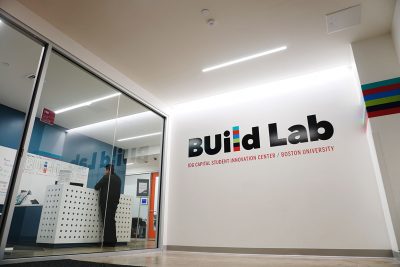When graduate and postgraduate students run into trouble turning their ideas into businesses, they can now look to a new workshop series by Boston University that aims to guide these hopeful entrepreneurs in the right direction.

The university-wide initiative Innovate@BU has been hosting a workshop series for BU’s doctoral and postdoctoral students with aspirations to actualize their ideas into businesses. Innovate@BU hosted Sept. 29 “Unlocking the Black Box of Business,” which discussed students’ pathways to entrepreneurship.
Speaker Michael Pratt, managing director of BU’s Office of Technology Development, specializes in helping engineering and computer science students transfer technologies to other industries.
He began his presentation by explaining the benefit of student entrepreneurs having intellectual property owned by the University rather than themselves.
“If we had an environment where everybody owned their own inventions, it would create a lot of confusion and, frankly, would interfere with trust,” Pratt said. “People might not feel open about disclosing their best ideas in a lab group meeting if they knew that all the different people in the lab would have different intellectual property interests.”
Pratt also said intellectual property rights are beneficial because students will then be able to feel comfortable exchanging ideas without fearing the need to protect their own rights to it.
“This democratizes the process of sharing: everybody’s on an equal footing according to that policy,” Pratt said. “You know when you walk into that lab group meeting and you share an idea, it’s clear that Boston University is going to own that idea, and the inventors will share in that benefit, but it’s owned by that institution.”
Throughout the event, Pratt spoke about additional principles to keep in mind, such as that behind the conflict of commitment policy: when a graduate student commits to an external activity like taking part in a startup, they may find themselves less available to meet the time commitment required of completing a doctoral dissertation.
Conflicts of interest are also possible when working on an external business project in addition to one’s dissertation, Pratt said. One example is if a student’s company wants to commercialize the technology they’re working on in the research lab, but they’re not yet done with their dissertation.
“The laboratory has a goal to freely share that information in the world through publication of your dissertation,” Pratt said. “However, as the CEO of a young company, your fiduciary responsibility to that company is to do what’s in the best interest of those shareholders. Perhaps what’s in the best interest of the shareholders is to keep the technology secret.”
In such cases, Pratt said, a student has to ask themselves whether the conflict is “manageable.” In this specific circumstance, one solution could be to agree to publish the information, but to file patents before doing so.
“Transparency is your friend,” Pratt said. “Put it out there in the sun, let everybody see it, be transparent about it. And believe it or not, it protects you, and it protects your good name.”
One of the workshop’s attendees was Shen Ning, a sixth-year BU School of Medicine student and a research assistant at Massachusetts General Hospital. She said in an interview such events are “really important” to young entrepreneurs.
“It’s really great that BU is offering these types of workshops,” Ning said, “because I think as students, we are often not aware of the opportunities or some of the different technical issues regarding IP.”
Ning’s project, Science Rehashed, is a nonprofit that aims to provide free science knowledge to the public through a podcast where listeners can learn about developing research and other innovations.
After hearing about the workshop through Innovate@BU, which allows students to develop their ideas with faculty support, Ning said she is grateful to have opportunities like these for herself and other aspiring entrepreneurs.
“These teams will be coming up with solutions that are potentially medical devices or things that can be patentable,” Ning said, “and it’ll be useful, for example, to know about how IP works at BU with the policies.”
Rana Gupta, director of faculty entrepreneurship at Innovate@BU, is a frequent speaker and organizer for the workshop series, He said in an interview he was inspired to create the series after observing a need for students to address real-life applications for their studies and ideas.
“I was talking to several doctoral students, postdoctoral students, med students, residents, and I was listening to what it is they needed to learn,” Gupta said. “I realized what they are asking me constantly is for understanding, in a sense, how policy works, how business works, how law works beyond what they’re practicing.”
Gupta also said the workshop series is not limited to creating businesses and startups, but can also be a resource for young people to make decisions outside of the academic world.
“It’s not focused entirely on just entrepreneurship or any particular topic. It’s focused on skills, pathways and learning new things,” Gupta added. “The whole idea is to open them up to a new way of thinking, new skills, new career ideas. It’s unlocking a black box of business.”











































































































